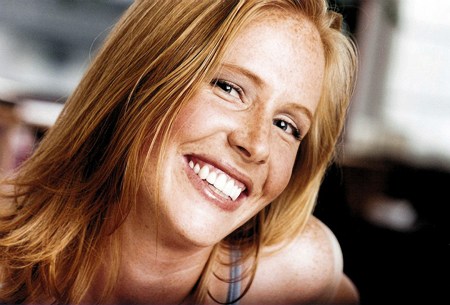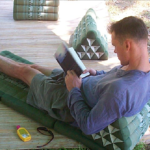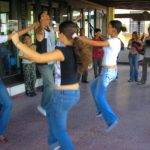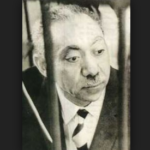Darley Newman is the host, writer and producer of the Emmy-winning Equitrekking TV series broadcast nationally on PBS and international networks in over 82 countries, and owner of DCN Entertainment, a multi-media production company. She hosts, writes and produces, Travels with Darley on the AOL On Network and Travel Like the Locals with Darley on ulive, the Scripps Networks Interactive video site. She’s been honored with five Daytime Emmy Award nominations, the North American Travel Journalist Award, and the Inspiring Woman Award from Women in Philanthropy and Leadership. In addition to writing an award-winning travel book and articles for CNN, Budget Travel and Women’s Adventure, she has hosted and produced for Ralph Lauren TV, Starz Networks Encore Channels, and covered the White House for Talk Radio News Service.
How did you get started traveling?
My first international trip was in high school when I took a European cruise with a friend’s family. It was an eye-opening journey and such an adventure, but since we had such a short amount of time in each area, it only made me crave a more in-depth experience. Later in high school, I studied abroad for a summer in Salamanca, Spain, living with a family. I felt like a local as I got to know the people more intimately while in this wonderful, walk-able university town. After that, I went abroad every chance I could, including studying abroad and living with a family in college in Florence, Italy. Had I not been in a train accident in Hungary while backpacking around Europe following the conclusion of my studies, I may not have come back!
How did you get started writing, and presenting for television?
I sought out jobs and internships that would give me experience in research, writing and production. I did everything from being a contract camera operator for a local TV station for a summer after high school, to reporting from the White House for the Talk Radio News Service, to being a production assistant on a FRONTLINE documentary for PBS. In college, I had a part-time job doing research for James Patterson, which involved traveling to various places in DC and writing about what I saw —— the details and little things you wouldn’t notice unless you’d been there. It opened my eyes to how important it is to intimately know what you’re writing about and how experiences are so important for good writers, whether writing fiction or non-.
I had various production and research jobs on documentaries and TV series and wrote for equestrian magazines before deciding to try to launch my own travel TV show, Equitrekking, which I host, write and produce. It took a lot of hard work and creativity to launch Equitrekking, but has been a great success and allowed me to meet amazing people around the world, travel, write and share it all with others.
What do you consider your first “break” as a writer and presenter?
Getting Equitrekking on nationally on PBS. I started Equitrekking by creating a pilot episode, for which I raised sponsorship, and broadcasting it on a small, niche network that is no longer even around. I then used that pilot as a proof of concept, building on each success and working my way up within the Public Broadcasting system to create a series that rated well and resonated with viewers.
As a traveler and fact/story gatherer, what is your biggest challenge on the road?
Sometimes trying to find the facts to back up the stories and information we’ve been told by the locals with whom we interact can be difficult. I often say that we discover things that aren’t found in the guidebooks and a lot of knowledge we end up sharing is not even online, believe it or not. It can be a challenge to fact check, but it’s great, because we know we are creating something from which others can learn and say, “Hey, I didn’t know that!”
What is your biggest challenge in the research and writing process?
As an entrepreneur, I have to juggle a lot of different tasks, and often finding time to fit in everything that I’d like to work on is tough. I would be writing a lot more if I had a bit more time.
What is your biggest challenge from a business standpoint?
As a public television series, we are responsible for soliciting sponsorship, which in today’s advertising market and increasingly segmented media industry make for a persistent challenge. However, given time and consistently strong ratings and global distribution, the burden has eased, and we’ve developed some innovative strategies for cross-promotion and other media inclusion that provides our sponsors with measurable return on investment.
Have you ever done other work to make ends meet?
For sure! As an entrepreneur, it’s a big risk when you finally quit your day job and go full force into your own endeavor. I worked a freelance writer/ producer and also as a public relations consultant when I was first launching my PBS series, skills that have certainly helped me as a media entrepreneur.
What travel authors or books might you recommend and/or have influenced you?
If you like travel adventure stories, especially true stories of historic travels and exploration, I’d recommend The River of Doubt: Theodore Roosevelt’s Darkest Journey by Candace Millard, which traces Roosevelt’s harrowing journey along a hereto unexplored tributary feeding into the Amazon. It’s fascinating to read about the courageous pioneers of travel, who often relied on the locals and hoped they were getting good information in their sometimes deadly journeys.
For a more modern take on travel and culture, I like Tim Cope’s On the Trail of Genghis Khan: An Epic Journey Through the Land of the Nomads and A Good Horse Has No Color: Searching Iceland for the Perfect Horse
by Nancy Marie Brown. I also like Bill Bryson, especially Notes from a Small Island
.
What advice and/or warnings would you give to someone who is considering going into travel writing?
I would recommend carving out your own niche and making sure that niche is something for which you have a passion. You will end up working very hard and sometimes for little or no pay, so having an end goal and being creative with your approach and personal brand is key.
What is the biggest reward of life as a travel writer?
The travel. It’s a privilege to be able travel the world.





